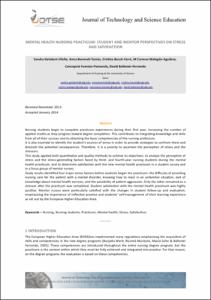Mostra el registre d'ítem simple
Mental health nursing practicum: student and mentor perspectives on stress and satisfaction
| dc.contributor.author | Gelabert Vilella, Sandra |
| dc.contributor.author | Bonmatí Tomàs, Anna |
| dc.contributor.author | Bosch Farré, Cristina |
| dc.contributor.author | Malagón Aguilera, Carme |
| dc.contributor.author | Fuentes Pumarola, Concepció |
| dc.contributor.author | Ballester Ferrando, David |
| dc.date.accessioned | 2015-02-23T11:15:37Z |
| dc.date.available | 2015-02-23T11:15:37Z |
| dc.date.issued | 2014-05 |
| dc.identifier.citation | Gelabert Vilella, Sandra [et al.]. Mental health nursing practicum: student and mentor perspectives on stress and satisfaction. "JOTSE: Journal of Technology and Science Education", Mayo 2014, vol. 4, núm. 2, p. 79-88. |
| dc.identifier.issn | 2013-6374 |
| dc.identifier.issn | 2014-5349 |
| dc.identifier.uri | http://hdl.handle.net/2099/16091 |
| dc.description.abstract | Nursing students begin to complete practicum experiences during their first year, increasing the number of applied credits as they progress toward degree completion. This contributes to integrating knowledge and skills from all of their courses and to obtaining the basic competencies of the nursing profession. It is also essential to identify the student’s sources of stress in order to provide strategies to confront them and diminish the potential consequences. Therefore, it is a priority to ascertain the perception of stress and the stressors. This study applied both quantitative and quality methods to achieve its objectives: to analyze the perception of stress and the stress-generating factors faced by third- and fourth-year nursing students during the mental health practicum, and to determine satisfaction with the new mental health practicum in a student survey and in a focus group of mentor nurses. Study results identified four major stress factors before students began the practicum: the difficulty of providing nursing care for the patient with a mental disorder, knowing how to react in an unfamiliar situation, lack of knowledge about mental health services, and the possibility of patient aggression. Only the latter remained as a stressor after the practicum was completed. Student satisfaction with the mental health practicum was highly positive. Mentor nurses were particularly satisfied with the changes in student follow-up and evaluation, emphasizing the importance of reflective practice and students’ self-management of their learning experience as set out by the European Higher Education Area |
| dc.format.extent | 10 |
| dc.language.iso | eng |
| dc.publisher | Universitat Politècnica de Catalunya. Institut de Ciències de l'Educació |
| dc.rights | Attribution-NonCommercial 3.0 Spain |
| dc.rights.uri | http://creativecommons.org/licenses/by-nc/3.0/es/ |
| dc.subject | Àrees temàtiques de la UPC::Ensenyament i aprenentatge |
| dc.subject.lcsh | Education, Higher |
| dc.subject.lcsh | Nursing students |
| dc.subject.lcsh | Nursing--Study and teaching |
| dc.subject.lcsh | Mental health |
| dc.subject.lcsh | Stress (Psychology) |
| dc.subject.lcsh | Satisfaction |
| dc.subject.other | Nursing |
| dc.subject.other | Practicum |
| dc.title | Mental health nursing practicum: student and mentor perspectives on stress and satisfaction |
| dc.type | Article |
| dc.subject.lemac | Ensenyament universitari |
| dc.subject.lemac | Infermeria -- Ensenyament universitari |
| dc.subject.lemac | Salut mental |
| dc.subject.lemac | Estrès (Psicologia) |
| dc.identifier.doi | 10.3926/jotse.96 |
| dc.identifier.dl | B-2000-2012 |
| dc.description.peerreviewed | Peer Reviewed |
| dc.rights.access | Open Access |
| local.citation.author | Gelabert Vilella, Sandra; Bonmatí Tomàs, Anna; Bosch Farré, Cristina; Malagón Aguilera, Carme; Fuentes Pumarola, Concepció; Ballester Ferrando, David |
| local.citation.publicationName | JOTSE: Journal of Technology and Science Education |
| local.citation.volume | 4 |
| local.citation.number | 2 |
| local.citation.startingPage | 79 |
| local.citation.endingPage | 88 |
Fitxers d'aquest items
Aquest ítem apareix a les col·leccions següents
-
2014, Vol. 4. núm. 2 [7]
4th international UNIVEST: Strategies towards collaborative learning


